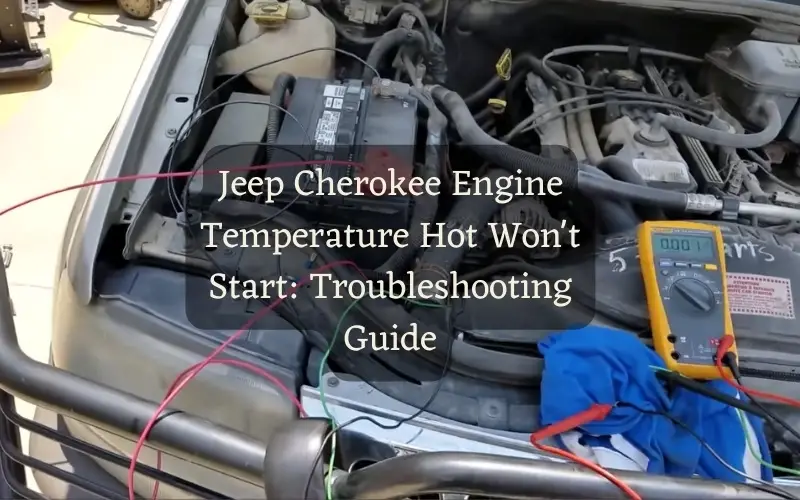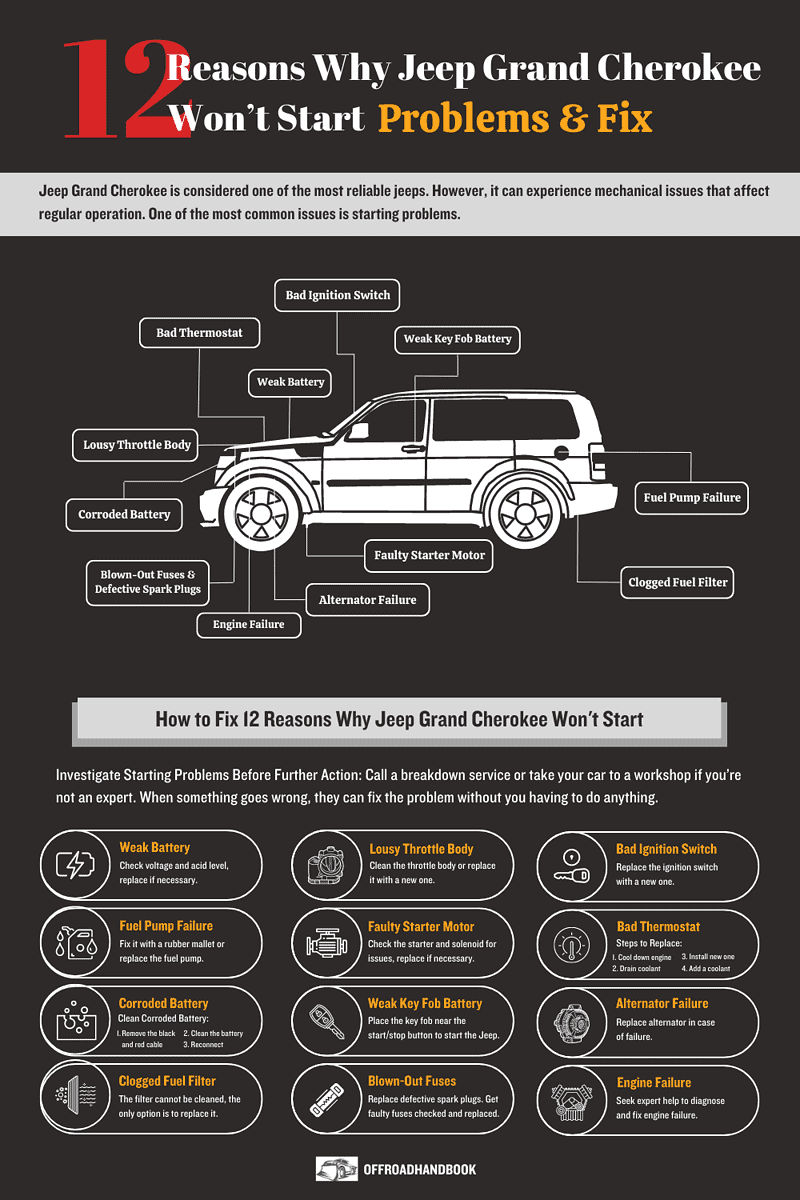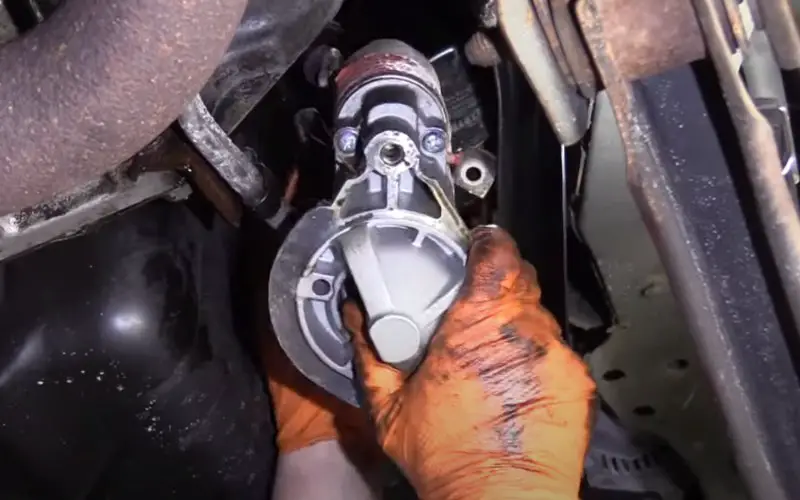Troubleshooting a Jeep Cherokee That Won’t Start: A Comprehensive Guide
Troubleshooting a Jeep Cherokee That Won’t Start: A Comprehensive Guide
Introduction
With great pleasure, we will explore the intriguing topic related to Troubleshooting a Jeep Cherokee That Won’t Start: A Comprehensive Guide. Let’s weave interesting information and offer fresh perspectives to the readers.
Table of Content
Troubleshooting a Jeep Cherokee That Won’t Start: A Comprehensive Guide

A Jeep Cherokee refusing to start can be a frustrating experience, leaving you stranded and wondering where to begin. The reasons for this issue can range from simple, easily fixable problems to more complex mechanical failures. This comprehensive guide aims to provide a clear and informative understanding of the potential causes, equipping you with the knowledge to diagnose and potentially resolve the issue.
Understanding the Starting Process
Before delving into specific causes, it’s essential to understand the basic steps involved in starting a Jeep Cherokee:
- Key Ignition: When the key is turned to the "on" position, power flows to the ignition system, activating the fuel pump and various sensors.
- Fuel Delivery: The fuel pump delivers fuel to the engine, while the fuel injectors spray it into the cylinders.
- Spark Generation: The ignition system creates a spark in the cylinders, igniting the fuel-air mixture.
- Engine Cranking: The starter motor engages, rotating the crankshaft, and initiating the combustion cycle.
If any of these steps are disrupted, the engine will fail to start.
Common Causes for a Jeep Cherokee That Won’t Start:
1. Battery Issues:
- Dead Battery: A completely discharged battery will prevent the starter motor from engaging. This is often indicated by a dim or flickering dashboard light.
- Battery Corrosion: Corrosion on the battery terminals can impede the flow of electricity, preventing the starter from receiving enough power.
- Battery Cables: Loose or corroded battery cables can also disrupt the electrical connection to the starter.
2. Starter Motor Problems:
- Starter Solenoid Failure: The starter solenoid is responsible for engaging the starter motor. A faulty solenoid will prevent the starter from spinning.
- Starter Motor Failure: The starter motor itself can fail due to wear and tear or internal damage.
3. Ignition System Malfunctions:
- Ignition Switch Failure: A faulty ignition switch can prevent power from reaching the starter motor or other critical components.
- Ignition Coil Problems: The ignition coil provides the high voltage needed to create a spark. A faulty coil will prevent the engine from firing.
- Spark Plugs and Wires: Worn or fouled spark plugs and damaged wires can impede spark delivery to the cylinders.
4. Fuel System Issues:
- Fuel Pump Failure: A malfunctioning fuel pump will not deliver fuel to the engine, preventing combustion.
- Fuel Filter Clogging: A clogged fuel filter can restrict fuel flow, preventing the engine from receiving enough fuel.
- Fuel Line Problems: Damaged or blocked fuel lines can also disrupt fuel delivery.
5. Engine Management System (EMS) Malfunctions:
- Sensors: Various sensors, such as the crankshaft position sensor, camshaft position sensor, and oxygen sensor, provide vital information to the EMS. A faulty sensor can lead to incorrect engine operation.
- Computer Module Failure: The engine control module (ECM) is responsible for managing the engine’s operation. A faulty ECM can prevent the engine from starting.
6. Other Potential Causes:
- Timing Belt/Chain Problems: A broken or damaged timing belt/chain can disrupt the engine’s timing, leading to a no-start condition.
- Air Intake Obstruction: A blocked air intake can prevent the engine from getting the necessary air for combustion.
- Mechanical Issues: Damaged pistons, valves, or other internal engine components can prevent the engine from running.
FAQs
Q: How do I check if the battery is the problem?
A: Use a voltmeter or a multimeter to test the battery voltage. A fully charged battery should read around 12.6 volts. If the voltage is significantly lower, the battery is likely dead.
Q: What if the battery is fine, but the car still won’t start?
A: If the battery is good, the next step is to check the starter motor and the ignition system. You can try tapping on the starter motor with a hammer to see if it engages.
Q: How do I troubleshoot the fuel system?
A: You can check for fuel pressure by using a fuel pressure gauge. If there is no fuel pressure, it’s likely a problem with the fuel pump or fuel filter.
Q: What should I do if I suspect a problem with the engine management system?
A: You can use a code reader to scan for any diagnostic trouble codes (DTCs) stored in the ECM. These codes can provide valuable information about the potential problem.
Tips
- Check the basics first: Before diving into complex troubleshooting, ensure the battery is charged and the cables are clean and connected properly.
- Listen for sounds: Pay attention to any noises the engine makes when you try to start it. A clicking sound could indicate a starter issue, while a whirring sound might suggest a fuel pump problem.
- Consult the owner’s manual: Your Jeep Cherokee’s owner’s manual contains valuable information about diagnosing common issues.
- Seek professional help: If you’re unable to diagnose the problem, it’s always best to take your Jeep to a qualified mechanic.
Conclusion
Diagnosing a Jeep Cherokee that won’t start requires a methodical approach and understanding of the vehicle’s systems. By following the steps outlined in this guide, you can identify the most likely cause and potentially resolve the issue yourself. However, remember that some problems may require the expertise of a qualified mechanic. With patience and the right information, you can get your Jeep Cherokee back on the road and ready for adventure.








Closure
Thus, we hope this article has provided valuable insights into Troubleshooting a Jeep Cherokee That Won’t Start: A Comprehensive Guide. We hope you find this article informative and beneficial. See you in our next article!